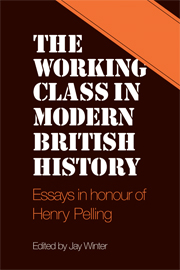Book contents
- Frontmatter
- Contents
- Introduction: labour history and labour historians
- I The working class in British politics
- 1 The social democratic theory of the class struggle
- 2 Keir Hardie and the Labour Leader, 1893–1903
- 3 Winston Churchill and the working class, 1900–14
- 4 Expectations born to death: local Labour party expansion in the 1920s
- 5 Post-war reconstruction in Wales, 1918 and 1945
- 6 Imperialism and the Labour government of 1945–51
- II The working class in British society
- List of the published writings of Henry Felling
- Notes
- Index
3 - Winston Churchill and the working class, 1900–14
Published online by Cambridge University Press: 05 November 2011
- Frontmatter
- Contents
- Introduction: labour history and labour historians
- I The working class in British politics
- 1 The social democratic theory of the class struggle
- 2 Keir Hardie and the Labour Leader, 1893–1903
- 3 Winston Churchill and the working class, 1900–14
- 4 Expectations born to death: local Labour party expansion in the 1920s
- 5 Post-war reconstruction in Wales, 1918 and 1945
- 6 Imperialism and the Labour government of 1945–51
- II The working class in British society
- List of the published writings of Henry Felling
- Notes
- Index
Summary
Winston Churchill's career before 1914 depended in many respects on his relations with the urban working class. When he was first returned to parliament, in 1900, he owed his election to the cotton workers of Oldham, where he took his stand on his father's old platform of Tory Democracy. Churchill was then only twenty-five, a political novice with an unquenchable thirst for recognition and an intense drive to keep ahead of political events. As he grew and changed, Tory Democracy proved to be the first of his many roles, and the first of the four faces that Churchill presented to the world of labour before the First World War.
The second face was that of Free Trade. In 1903 Joseph Chamberlain split the Unionist party (or the Conservatives as they will be called here) with his campaign for tariff reform. Churchill rejected not only Chamberlain's programme but, more crucially, the compromise position cobbled together by Arthur Balfour in the hope of minimizing the divisions within the party. Taking the pure free-trade line, he crossed to the Liberal benches in 1904 and was adopted as the candidate for the prosperous commercial constituency of Manchester North-West. In the run-up to the general election of 1905, Churchill was second only to Asquith in advertising the merits of free trade to the electorate, and was suitably rewarded when Campbell-Bannerman appointed him Under-Secretary at the Colonial Office (in December 1905).
- Type
- Chapter
- Information
- The Working Class in Modern British HistoryEssays in Honour of Henry Pelling, pp. 43 - 64Publisher: Cambridge University PressPrint publication year: 1983



